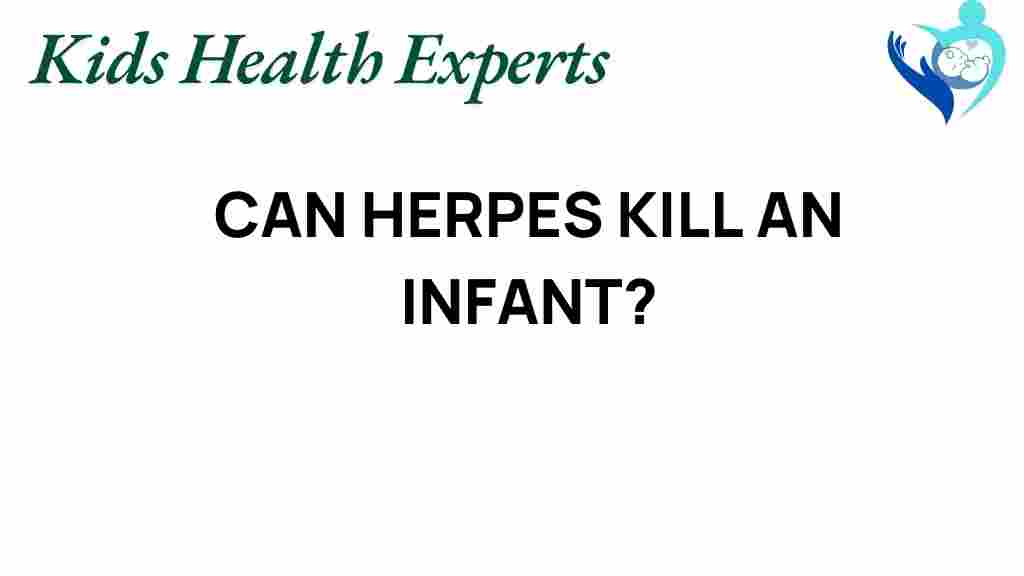The Hidden Dangers: Can Herpes Pose a Threat to Infants?
Herpes is a common viral infection that affects millions of people worldwide. While most adults manage the condition without significant issues, there is a crucial aspect of herpes that demands attention—its potential risks to infants. Understanding the transmission of herpes, especially neonatal herpes, is vital for parents and caregivers to ensure the health and safety of their little ones. This article will delve into the risks associated with herpes transmission to infants, raise awareness about neonatal herpes, and provide prevention strategies.
Understanding Herpes and Its Types
Herpes is primarily caused by two types of viruses: Herpes Simplex Virus type 1 (HSV-1) and Herpes Simplex Virus type 2 (HSV-2). Both types can cause infections in infants, but they are often transmitted in different ways:
- HSV-1: Typically causes oral herpes (cold sores) but can also lead to genital herpes. Transmission usually occurs through kissing or sharing utensils.
- HSV-2: Primarily causes genital herpes and is most commonly transmitted through sexual contact.
Infants may be at risk of contracting herpes during delivery or through close contact with an infected person, leading to a condition known as neonatal herpes.
What is Neonatal Herpes?
Neonatal herpes is a severe infection caused by the herpes virus in newborns, usually occurring within the first month of life. The risks of herpes in infants are particularly concerning because their immune systems are still developing, making them vulnerable to the virus’s effects.
There are two forms of neonatal herpes:
- Skin, Eye, and Mouth (SEM) Infection: This is the mildest form, resulting in lesions on the skin or in the mouth, and can usually be treated effectively.
- Central Nervous System (CNS) Infection: This severe form can lead to complications such as seizures, brain damage, or even death. It occurs when the virus spreads to the baby’s brain.
How Does Transmission Occur?
Transmission of herpes to infants can occur in several ways:
- During Delivery: If the mother has an active genital herpes outbreak at the time of delivery, the virus can be passed to the baby as it passes through the birth canal.
- Postnatal Contact: Infants can contract herpes after birth through close contact with caregivers who have active herpes lesions, particularly through kissing or skin-to-skin contact.
- Asymptomatic Shedding: Even when a person with herpes does not have visible sores, the virus can still be present on the skin and transmitted to others.
The Risks of Herpes for Infants
The risks associated with herpes in infants are significant and can lead to serious health complications. Some of the potential risks include:
- Severe Illness: Neonatal herpes can result in debilitating conditions for the infant, including skin infections, pneumonia, or encephalitis.
- Long-term Consequences: Infants who survive severe infections may suffer from neurological issues, developmental delays, or other chronic health problems.
- High Mortality Rate: Untreated neonatal herpes can lead to death in a significant number of cases, particularly in those with CNS infections.
Signs and Symptoms of Neonatal Herpes
Parents should be aware of the signs and symptoms of neonatal herpes, which can appear within the first few weeks of life. Common symptoms include:
- Fever or low body temperature
- Unusual irritability or lethargy
- Skin lesions or blisters
- Difficulty feeding
- Seizures
It is crucial to seek immediate medical attention if any of these symptoms are observed, as early intervention can significantly improve outcomes.
Prevention Strategies for Parents and Caregivers
Awareness and preventive measures are essential in safeguarding infants from herpes. Here are some strategies to consider:
- Testing and Disclosure: Pregnant women should be tested for herpes, and those with a known diagnosis should inform their healthcare providers to discuss delivery options and preventive measures.
- Avoiding Contact: Caregivers with active herpes lesions should avoid close contact with infants, including kissing or holding them, until the sores have healed.
- Hygiene Practices: Regular handwashing and avoiding sharing utensils, towels, or personal items can reduce the risk of transmission.
- Use of Antiviral Medications: Pregnant women with a history of herpes may be prescribed antiviral medications during pregnancy to decrease the risk of transmission during delivery.
What to Do if You Suspect Herpes Transmission
If you suspect that an infant has been exposed to herpes or is showing symptoms, follow these steps:
- Contact a Healthcare Provider: Seek immediate medical attention to have the infant evaluated.
- Follow Medical Advice: Adhere to prescribed treatment plans, which may include antiviral medications.
- Monitor Symptoms: Keep a close watch on the infant for any worsening symptoms and report these to healthcare professionals promptly.
Troubleshooting Common Concerns
Many parents have concerns about herpes and its implications for their infants. Here are some common questions and answers:
- Can I still kiss my baby if I have a cold sore?
It is best to avoid kissing your baby when you have an active cold sore, as this can transmit the virus. Wait until the sore has fully healed. - What if my partner has herpes?
Discuss the situation openly and consult a healthcare provider about how to minimize risks during pregnancy and after the baby is born. - Is there a vaccine for herpes?
Currently, there is no vaccine available for herpes. The best prevention is awareness and adherence to safety measures.
Conclusion
Herpes poses significant risks to infants, particularly through the transmission of neonatal herpes, which can lead to severe health complications. Raising awareness about these risks, understanding the modes of transmission, and implementing preventive measures can protect the health and safety of infants. Parents and caregivers must prioritize open communication with healthcare providers and take proactive steps to ensure their little ones are safe from the hidden dangers of herpes. For more information on herpes and its implications, visit this resource.
By fostering awareness and practicing prevention, we can safeguard our infants and ensure they grow up healthy and strong.
This article is in the category Conditions and created by KidsHealthExperts Team
